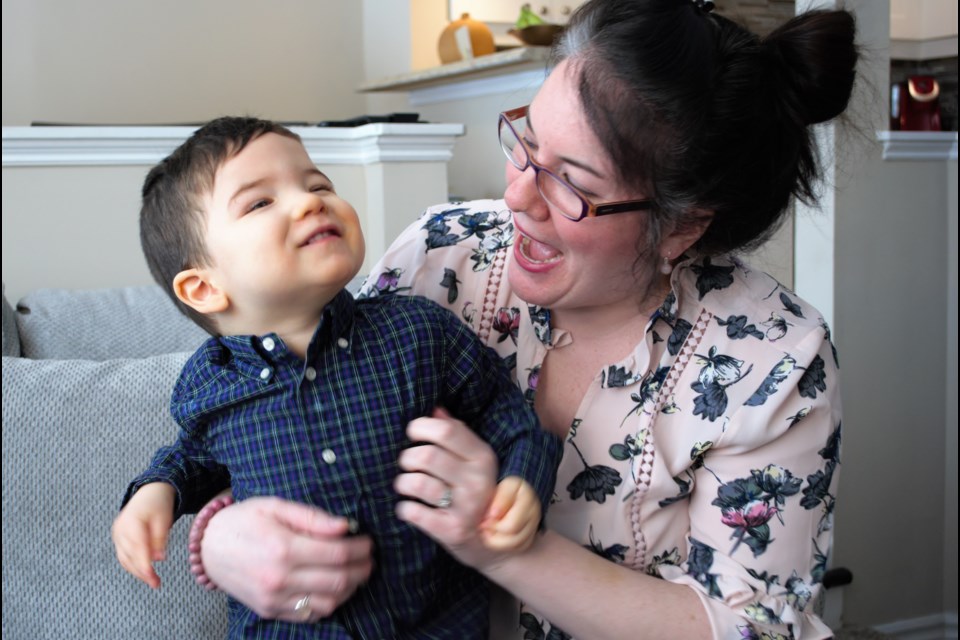While the Progressive Conservative government has announced this it will be rolling back controversial changes to funding for autism therapy, some families are left to pick up the pieces.
Minister of Children, Community and Social Services Todd Smith announced Monday the province would be reverting back to the needs-based autism program funding that was in place before the government made changes in February.
The change comes after intense backlash for the decision to switch to a system that would disperse smaller amounts of funding to more people with the goal of eliminating the wait-list for therapy.
Don’t want to miss any local news? Sign up for our daily headlines email
“It is clear that we didn’t get the redesign right the first time and I am here to tell you that we will now,” Smith said.
“I think, overall, that’s good news. But I think it’s put parents and families through unnecessary stress since February,” Katie Maracle said in an interview on Tuesday.
Maracle first spoke with Village Media in February about the autism changes and how they would impact her two-year-old son, Ethan, who had been recently diagnosed.
Over the past few months, Maracle says she has attended multiple meetings and public consultations between local MPPs and families of children with autism.
“I think they’ve understood now, because we were vocal,” Maracle said with a laugh. “It’s tough. All those meetings, they’re very emotional when parents tell their stories. Kids were benefiting so much from Ontario autism programming and then to take it away was heartbreaking.”
Maracle said that if she’d had it her way, the government would have done public consultations first before making decisions and announcements about change.
“They said they did, but I’d like to know who they were talking to because it’s very clear that they wouldn’t have made the changes they did if they actually consulted parents,” she said. “It would have been a lot smoother if they would have done the consultations first.”
Smith also outlined steps the PC government is taking to provide continuity of service while giving the necessary time to work on the new autism program.
"My message to families of children and youth with autism is, we have heard you, and we are taking action," Smith said.
According to the government news release, these steps include broadening the scope of the Autism Advisory Panel to develop recommendations for a new needs-based and sustainable program, continuing services for families with existing behaviour plans and continuing to issue childhood budgets.
As previously announced, Ontario is investing an additional $278 million in the Ontario Autism Program, bringing the total amount of annual funding to $600 million.
The news release says the panel is examining results from online surveys, telephone town halls and written submissions, as well as considering relevant evidence, science and data to submit its advice for the end of summer, with the ministry aiming for implementation of a new needs-based program by April 1, 2020.
Amanda Baysarowich is the director and owner of IBI Behavioural Services in Barrie, which serves Simcoe County and York Region. In February, she said she saw an influx of families coming to her clinic.
“We saw an increase in families who said, ‘The government is not going to help me, (so I'll) liquidate and cash out whatever I can to get my kid the help because no one is going to help me',” she said. “It was devastation.
“There was fear in the staff. There was fear in the families,” Baysarowich added.
Baysarowich opted to take matters into her own hands and said she attended every meeting and consultation possible county-wide since February to make sure the government knew the impact the cuts would have, including private roundtables.
“My clinic organized protests at (Barrie-Innisfil) MPP Andrea Khanjin’s office. We took down two busloads to a Queen’s Park rally,” she said.
Baysarowich was floored to have Premier Doug Ford accept her invitation to visit her clinic in May.
“He toured all three facilities. He met with therapists and watched the therapy. From that day forward, my view of the entire situation kind of turned. His eyes welled up with tears,” she said.
Within a month came Ford’s cabinet shuffle, which saw Lisa MacLeod pulled as minister of Children, Community and Social Services.
“I genuinely think that Premier Ford knew. I think he’s kind of getting lost in the credit here as well,” said Baysarowich. “I think giving these six-month extensions and moving to a needs-based model is absolutely the right path for Ontario.
“We’re not going to clear the wait list. That’s impossible because then you run into capacity issues. Is it a perfect program yet? No. But with some development and time, I think it will get there,” she added.
Maracle said her family’s personal funding situation worked out serendipitously. Almost immediately after the cuts were announced in February, Maracle’s son was approved for a First Nations grant that would pay for his treatment for one year.
That funding will bridge the gap for her family for the period the provincial government funding was uncertain.
“It was specifically for First Nations children, so we were able to access that, but others weren’t,” said Maracle. “It’s kind of bittersweet. I’m happy they’re changing it back, but... I feel this has really wasted a lot of people’s time and energy.
“I hope they’re able to put everything back in place and that those families that lost out on that precious time with their kids in therapy can gain that back,” she added.

